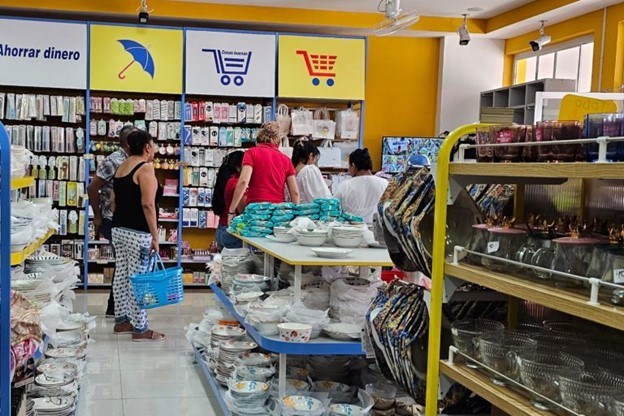
Chinese stores with bargain basement prices are expanding far beyond Nicaragua’s capital. It’s a “slap in the face” to local commerce, merchants lament.
HAVANA TIMES – Dozens of local businesses in the departments of Nicaragua have seen sales drop by up to 70% following the opening of Chinese stores that are spreading throughout the country. Entrepreneurs and business owners claim they don’t have the “capacity to compete with the Asians,” who offer retail goods at the wholesale prices the merchants previously found in Managua.
For two years, Marcos has sold electronic accessories in Matagalpa, in northern Nicaragua. But at the beginning of 2024, the first Chinese store opened near his business, offering similar or identical products at lower prices. Since that time, his sales have decreased by 80%.
“My main category was cell phone accessories, but I stopped selling them because they were just sitting on the shelves. The Chinese sell chargers or headphones at 10 or 15 cordobas each [US 28-46 cents] while I sell them at 40 or 50 [US $1.10 – $1.36], so people prefer to buy from them,” he explains.
In some cases, the price of products at the Chinese retail stores was the same as he paid wholesale in Managua as a supplier. The merchant also feels the impact of this new competition on his business alliances, as he used to place items in stores in other departments. However, those businesses have been equally affected. “That all collapsed. The last order I sent outside of Matagalpa was in January,” he recalls.
To Marcos, the arrival of Chinese businesses in the departments of Nicaragua is a “slap in the face” for local businesses. “We don’t have the capacity to compete with the Chinese. I’m not going to deny that it’s affecting us a lot,” he laments.
Chinese businesses expand into Nicaragua’s western departments
In Chinandega, in western Nicaragua, Leticia began selling cosmetics, beauty products, personal care items, and costume jewelry in her home a year ago. But in March 2024, a large Casa Mundo store – a branch of Tienda 3B located in Managua – opened near Chinandega’s Central Park.
Leticia is upset at the lack of customers in her business after the opening of the Chinese store.
“This is going to break most small merchants and businesses here in Chinandega. We thought those stores were going to be wholesale outlets, to help businesses save on shipping or travel costs from Managua,” she explains.
The Chinese store sells home appliances, furniture, home and office items, and fashion products including cosmetics and beauty items of the same brands that Leticia offers, sometimes at half the price.
A perfume she was selling for the equivalent of US $4 dollars is available at the Chinese store for around US $2.20, the same price she could get wholesale in Managua. Leticia claims that other merchants and entrepreneurs are going through the same situation. Even if they wanted to lower their prices, it’s “impossible,” because they must account for transportation, operational costs, and still make some profit.
“The Chinese offer better prices because they import their products directly from their country, and their suppliers must give them very low prices due to the large quantities. How can I compete with them, since I only order a few dozen of an item


